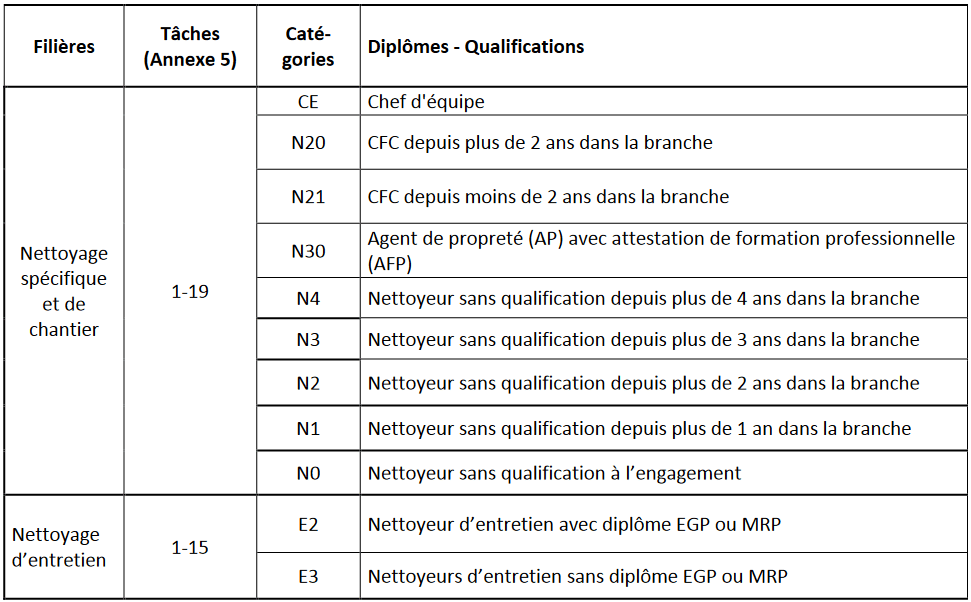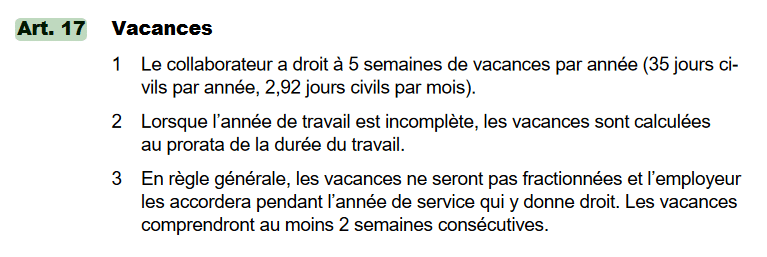
Collective labor agreements (CLA) in Switzerland: the essentials
What is a CLA?
A CLA is an agreement between employers or employers' associations and workers' unions. The main purpose of a collective bargaining agreement (CLA) is to regulate the working conditions and governs the relationship between the parties. The provisions contained in a CLA become part of the individual employment contract when the CLA takes effect.
A CLA automatically applies to workers who are members. In most cases, an employer does not have the choice of participating in a CLA in Geneva, but is subject to it by default. The rules governing CLAs are set out at Articles 356 to 358 of the Swiss Code of Obligations.
What should a CLA include?
Generally speaking, the CLAs in Geneva include provisions concerning minimum wages in the sector, working hours, vacations, 13th pay and employees' working conditions.
Types of CLA in Geneva
The company CLA
A company CLA is a agreement concluded by a single company. Its purpose is to regulate working conditions and relations between the parties. They apply solely to the employees of these companies. The list of companies with a company-wide CLA is available on the State of Geneva website.
The Sector CLA
Unlike the company CLA, the sector CLA is an agreement concluded by a group of companies. company group a specific sector and unions agreement. Like the company CLA, its purpose is to regulate working conditions and relations between the parties.
For example, the collective labour agreement for the cleaning industry in French-speaking Switzerland contains the following provisions rules to the individual employment contract, vacation periods, minimum wages according to occupational category, working hours and hours of work, vacations, insurance, etc.
The extended sectoral CLA
An extended sector CLA is, like the sector CLA, an agreement governing working conditions and the relationship between the parties (employer and employee). When a sector CLA is extended, this means that it is binding on all companies in the affected sector, even if they have not signed the agreement.
This type of CLA exists when there is reason to believe that employees in a certain sector are particularly vulnerable and should be protected. protected extensively. This is once again the case for cleaning, but also for structural trades.
What should a CLA contain?
Generally speaking, a CLA must include certain elements that are similar from one CLA to another. The most common elements are listed below.
Minimum wage
In most cases, a CLA will contain a "Wages" section, detailing the wages to be paid. minimum wages often based on the worker's training (or experience). Minimum wages are generally indexed annually.
Here is a example of base salaries in 2023 for the shell construction sector:

Professional categories
In general, a CLA includes the industry's occupational categories. As mentioned above, occupational categories generally form the basis for minimum wages.
As an example, here are the occupational categories in the cleaning sector:

Vacations
CLAs also include a "vacation" section, governing employees' vacation entitlements.
As an example, here are the vacation. in force in the hotel and catering sector:

Employment Contract
Normally, a employment contract in Switzerland can be concluded verbally. However, some CLAs require the employment contract to be in writing and to include certain mandatory elements. The CLAs requiring this usually provide a standard employment contract.
Other provisions
Although they have certain points in common, all CLAs are different, in order to best adapt to the specificities of the sector. For example, some CLAs might include provisions on break times, required work clothing, labor peace, treatment of discrimination, etc.
As a general rule, the content of a CLA takes precedence over the laws applicable by default. For example, the minimum wage in a CLA is not the cantonal minimum wage, but the one specified in the CLA. Furthermore, contribution deadlines take precedence over theBernese scale.
CLAs in force in Geneva by sector
- Collective labor agreements (CCT) by sector in Geneva
- Animators
- Architects
- Insurance
- Banks
- Private bankers
- Butchers
- Bakery and confectionery
- Breweries
- Engineering firms
- Body shop
- Call and contact centers
- Private clinics
- Hairdressers
- Professional actors
- Concierges
- Track construction
- Shoe repair and orthopedics
- Bicycle couriers and urban courier services
- Leather
- Druggists
- Scaffolders
- Scaffolders - Early retirement
- Music schools
- Education and rehabilitation
- EMS Medical-social establishments for the elderly
- Garages
- Surveyors
- Clothing
- Watchmaking - SYNA
- Watchmaking - UNIA
- Hotels and restaurants
- Swiss chocolate industry
- Swiss wood industry
- Graphics industry
- Swiss concrete products industry
- Swiss furniture industry
- Network infrastructure
- PR journalists
- Bookshop
- Organ builders
- Mechatronics - ASM (Swissmem)
- Mechatronics - UIG (Geneva)
- Metal
- Cleaning
- Textile cleaning
- Paper
- Parks and gardens
- Parks and gardens - Early retirement
- Early childhood - Intercommunal
- Early childhood - Ville de Genève
- Pharmacy - Office staff, operations, sales
- Pharmacy - Preparers
- Regional radio stations
- Chimney sweeps
- Private postal services
- Gas station shops
- Security
- Tailors
- Technicians for dentists
- Freight forwarders and customs declarants
- Transport - Removals
- Transport - TPG subcontractors
- Temporary work
- Swiss tile and brick factories





